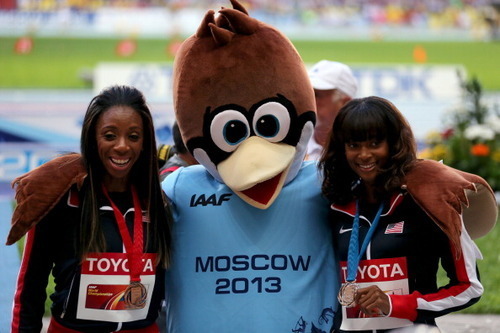Why, why, why Dalilah?

World 400m hurdles silver medallist Dalilah Muhammad is one of the hot new names to emerge in global athletics this year. SPIKES finds out how and why the world number 57 in 2012 became a podium filler at Moscow 2013.
After she stepped off the track sixth in the 400m hurdles heats at the 2012 US Olympic Trials, it would have taken a huge leap of faith to believe that a year later, Dalilah Muhammad would win a silver medal at the world championships.
Yet that is exactly what Muhammad, 23, did. The stand out improver of this season has hacked almost two-and-half seconds from her lifetime best to emerge as a world-class athlete.
Let’s rewind back to those US trials, when a despondent Dalilah, pronounced Dal-a-lah, was dumped out of the heats in Eugene, Oregon, in a modest time of 58.46.
“It was really disappointing, because I felt I could have made the Olympic team with the right tools around me,” says Muhammad, who graduated from USC (University of Southern California) in 2012.
“I knew at the time I had to make a drastic change if I wanted to continue.”
Change came after she met Yolanda Demus, coach and mother to 2011 world champion, Lashinda, at those US Trials.
After a couple of meetings, Yolanda agreed to take her on after the London 2012 Olympics.
“The first thing I looked at was who coaches the top athletes, and Yolanda was the first person I thought about,” says Muhammad, who, as a gifted teenager, won the 2007 world youth title before stagnating at college.
“Yolanda told me about the programme, and how she views the 400m hurdles, and in my heart it felt like a good match.”
Those ‘tools’ were now in place for Muhammad, who is also a loyal follower of the Islamic faith.
Not that the journey across Los Angeles to a new training base was easy. A New Yorker by birth, Muhammad was so used to catching the subway that she hadn’t learned how to drive.

Dalilah Muhammad (left) battles her way to the Moscow 2013 World Championships against Georganne Moline.
She took an intensive one-month driving course, in just enough time to drive to the first day of practise under her new coach, on October 15th 2012.
It’s a good job she successfully manouvered herself there too, and kick-start a journey that would radically change the course of her career.
The next challenge she faced was adapting to a tougher training load. The transition was hard and Muhammad remembers “dying in practise”.
“I remember not finishing a 400m workout,” she says. “I was really disappointed in myself and I was getting really discouraged. It was like: what is going on? I’ve never been this bad in practise before.”
That evening, coach Yolanda tried to raise her sprints by explaining that all athletes in her training programme find it tough. She then added one nugget of advice: ‘I don’t care how slowly you run, just finish the workout.’
Inspired by her coach’s words, Muhammad slowly adjusted to the training demands. Thriving in a group environment, she saw gradual improvements. Over time, training became more manageable and her confidence levels rose.
So what is it that marks Yolanda out as such a great coach?
“She really studies the sport to perfect it,” says Muhammad. “She’s able to look at what we are doing wrong and come up with a drill to correct it. My back end of the race was my weakness, but she introduced a lot of short recovery sessions to really help that back end.”
Muhammad has also thrived in the cut and thrust of competitive training sessions with Lashinda Demus, the 2011 world champion and London Olympic silver medallist.
“Lashinda is so competitive,” she says. “I’ve never seen anyone want it so bad. She trains with her whole heart and never complains. Her mum can give her the craziest session but she just gets on and does it. Her work ethic is something I’ve really learned from.”
Fuelled by this fresh approach, she set personal bests in her first FOUR 400m hurdles races of the season, trimming her PB from 56.04 to 54.66.
“It was just so exciting,” she says. “I had a huge sense of relief more than anything. At college I thought maybe track wasn’t for me, but I began to think: yes, I can do this.”
At the US champs she shocked her more experienced rivals to pip Georganne Moline by 0.05 in a new personal best time of 53.83, booking her spot on the US team for the Moscow 2013 World Championships.
And in the Russian capital, unfazed by the pressures of competing at her maiden senior championships, she outslugged her training partner Demus down the home stretch to clinch silver behind the all-conquering Zuzana Hejnova.

Team-mates Lashinda Demus (left) and Dalilah Muhammad (right) celebrate their world bronze and silver medals with Sparrow the sparrow (centre).
She took no extra pleasure from beating her training partner, though. “I see her every day in practise so to compete against her is nothing new. Also, I don’t think Lashinda was at her peak as she was coming off an injury.”
But still, Muhammad declared herself “very happy” to win world silver, and has since signed a contract with Nike.
Next season she hopes to further lower her personal best, and also work on improving her flat speed over 200m and 400m.
“It was just a beginning for me,” she says. “It was a great year for me, but I feel I can do so much more.”
